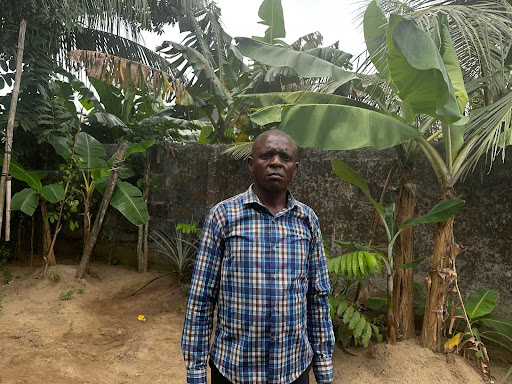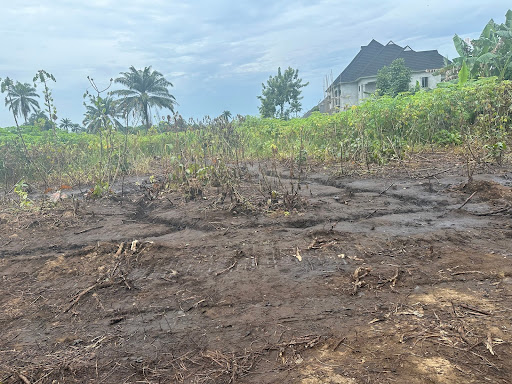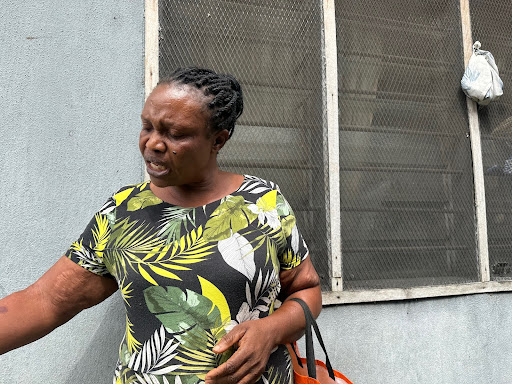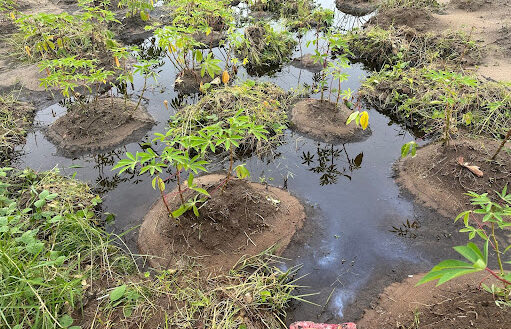On 6 May, disaster struck the quiet community of B-Dere in Gokana Local Government Area, Rivers State, as the Trans Niger Delta pipeline burst, unleashing a torrent of crude oil. For Daniel Kpoobari-Bani and his family, life turned upside down in an instant. The gushing oil, perilously close to their home, forced him, his wife, and their four children to evacuate immediately—fleeing both immediate danger and the longer-term hazards of contamination and fire.

“My compound was affected by the leakage,” Kpoobari-Bani recounted to PREMIUM TIMES during a reporter’s visit to the stricken community. “Since the incident, we have been in discomfort.” His story is unfortunately common across many parts of the oil-rich Niger Delta, where the hazards of oil extraction often overshadow its economic benefits.
Relief came nine days later, on 15 May, when Shell’s response team managed to halt the spillage. During the containment efforts, this reporter observed Shell tankers using large hoses to siphon off oil, bulldozers carving a path through the contaminated land, and soldiers providing security as residents watched anxiously.

The Immediate Chaos: Survival and Hazards
Before the arrival of professional responders, residents acted out of necessity—scooping up crude oil with buckets and jerrycans. The noxious fumes made breathing difficult, and the ever-present risk of fire rendered cooking nearly impossible. Many families, fearing for their lives, abandoned their homes, uncertain of when—or if—they could return safely.
With the land and crops saturated by crude oil, the blackened environment bore testament to the profound impact on livelihoods and food security. According to PREMIUM TIMES reports, farmlands and local water sources had become dangerously polluted, further compounding the uncertainty facing residents.

Cassava, cocoyam, banana, and plantain—staples in the local diet and central to the residents’ way of life—were left coated in oil. The leaves and stems dripped with residue, and some of the salvaged crude was hidden in crop fields. “Shell needs to relocate us from here,” Kpoobari-Bani pleaded, recalling a similar pipeline failure just two years earlier. “Crude oil has destroyed our crops, and we can no longer drink the water from our wells.”
This recent spill reignites longstanding grievances among communities in Ogoniland and other oil-producing areas, who have protested the environmental and social costs of oil operations for decades. These protests, as documented by several rights groups, have often met with official resistance rather than resolution.
The Niger Delta: Oil Wealth and a Heavy Toll
Since the commercial discovery of crude oil in Nigeria during the 1950s, the country has risen to become one of Africa’s oil giants. The Niger Delta region, which supplies the bulk of this resource, has paid a heavy price: environmental degradation, loss of arable land, and limited access to clean water.
Communities such as Ogoniland, dependent on farming and fishing, find themselves at the epicentre of relentless hydrocarbon pollution from pipeline failures and recurring leaks. “Continuous spills have made my land unusable,” notes Gbarale Joy, a farmer from Sii village.
The Quest for Remediation: Progress and Setbacks
The B-Dere spillage is just the latest in a series of ecological disasters across Ogoniland. After decades of pollution, a landmark 2011 United Nations Environment Programme assessment prompted the Nigerian government to launch an environmental remediation initiative. The Hydrocarbon Pollution Remediation Project (HYPREP), overseen by the Federal Ministry of Environment, was tasked with restoring contaminated land and water.
However, according to community leaders, the impact of these efforts has been minimal. Regular leaks and ongoing spills mean new pollution often outpaces cleanup—prompting some experts to question whether current measures are enough.
When contacted, HYPREP did not respond to PREMIUM TIMES’ request for comments, raising concerns about transparency and accountability.
Oil Spill Data: A Nationwide Challenge
Nigeria’s oil spill epidemic is supported by sobering statistics. According to the National Oil Spill Detection and Response Agency (NOSDRA), between 2015 and July 2025, more than 9,890 oil spill incidents have occurred across the country.
The highest number of reported spills came in 2023 (1,518 incidents), while the greatest volume—almost 56,000 barrels—was leaked in 2015. Rivers State leads the notorious rankings, accounting for 4,184 recorded spills, followed by Bayelsa, Delta, Akwa Ibom, and Imo. The main culprits are sabotage, equipment failure, and pipeline corrosion.
NOSDRA’s records attribute the specific B-Dere pipeline breach to “equipment failure” by the operator labelled “RENAISSANCE”—likely the Renaissance Africa Energy Company, which recently completed the acquisition of Shell’s Nigerian subsidiary, SPDC, in partnership with a consortium of Nigerian energy firms. Despite requests for comment, company representatives were yet to respond at the time of reporting.
Approximately 100 barrels (15,900 litres) of crude oil reportedly spilled as a result of a “rough-edged hole,” measuring about 10 cm in diameter, discovered on the pipeline. Community members, however, believe the actual quantity is much higher, alleging that oil flowed unchecked for a total of nine days.
Despite decades of devastation, environmental activists claim that comprehensive environmental assessments and proper compensation for affected communities remain rare. According to local leaders, Shell officials visited the spill site recently, documenting evidence and taking names for possible follow-up. “They told us to wait for their response,” Kpoobari-Bani said.
Agriculture and Fishing in Peril: Local Testimonies
For farmers like Gbarale Joy of Sii, the consequences are devastating. Five years ago, she abandoned her cassava, corn, and melon farms after oil pollution ruined the soil. “If we plant seeds, they rot. When my cassava should be ready to harvest, nothing is left underground,” she told PREMIUM TIMES. “Even seafood we used to get from the saltwater—periwinkle and other aquatic life—is gone due to the spills.”

The experience is echoed by fisherfolk. At Ibeno beach in Akwa Ibom, a major oil-producing and fishing hub, veteran fisherman Sylvanus Omotoye prepares his nets on the canoe’s edge, reflecting on a shrinking catch. “Due to oil spills, we now get less fish,” he explains. “Many fishermen have left for Cameroon.”
Ibeno and nearby areas like Mbo, Ikot Abasi, Onna, and Esit-Eket are renowned for oil and gas production. Yet locals, whose livelihoods depend on the water, say the environmental fallout has left them struggling to survive. “In the past, we didn’t have to go far to fish. Now the catch is poor and our nets often get ruined,” another fisherman lamented.
Activists Demand Accountability, Urgent Change
Skepticism remains high among environmental justice activists. “Oil spill has brought untold hardship to farmers across the Niger Delta. The soil has been contaminated for over 70 years. Their crops decay before harvest, and many take loans they cannot repay,” said Umo Isua-Ikoh, coordinator of the Peace Point Development Foundation (PPDF).

Mr Isua-Ikoh added, “Most palliative measures do not reach the actual victims. Politicians claim credit but the suffering persists, and affected people are rarely compensated.”
Local leaders such as John David, an Ibeno high chief, echoed this frustration. “NOSDRA officials always visit, but after they leave, nothing changes. Politicians give speeches, but the regular clean-up and compensation never happen,” he said.
Expert Insight: The Need for Sustainable Oil Infrastructure
Experts warn that repeated pipeline leaks and unaddressed oil well abandonment only invite further disaster. Nnimmo Bassey, director of HOMEF and prominent environmental campaigner, emphasized, “Pipelines and oil wells have defined lifespans and should be replaced or decommissioned, not left to become a danger.”
“Many wells drilled in the 1950s were simply abandoned in the 1970s and are still polluting the environment today. Frequent spills show clear negligence,” Bassey asserted. Nigerian regulations require decommissioning of oil facilities at the end of their useful lives, but in practice, enforcement can be lacking.
Comparative Challenges: Niger Delta in a Regional and Global Context
The Niger Delta’s struggle is not unique; oil-producing regions elsewhere in Africa and beyond have seen similar conflicts between economic gain and environmental welfare. In neighbouring Ghana, for example, social and regulatory pressures have influenced oil field operations in the Western Region. Studies by the African Centre for Energy Policy (ACEP) highlight the need for strict enforcement of environmental standards and broad stakeholder engagement to mitigate negative effects.
Moving Forward: Towards Accountability and Restoration
As Nigeria continues to rely on oil as a critical economic driver, ensuring that extraction does not come at the cost of its people and environment is essential. Strengthening regulatory oversight, transparent clean-up processes, and fair compensation are long-standing demands voiced by both community members and policy analysts.
With thousands of spills still occurring across the country, the path forward will require more than statements. It will demand concerted action from government, oil companies, environmental agencies, civil society—and, crucially, ordinary Nigerians whose lives are most at stake.
How do you think Nigeria—and other resource-rich African nations—can better protect communities from the dangers of oil spills while benefiting from natural resources? Share your thoughts in the comments and join the conversation for a greener, fairer future.
For general support, reach out at support@nowahalazone.com.
Let’s connect on social media: follow us on Facebook, X (Twitter), and Instagram for the latest updates, inside stories, and calls for community solutions!










